Number 712 - REM
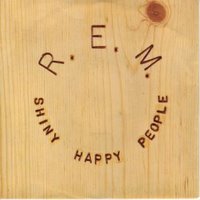

Number 712
REM
"Shiny Happy People"
(1991)
.
REM
"Shiny Happy People"
(1991)
.
.
.
As seen on Seseame St
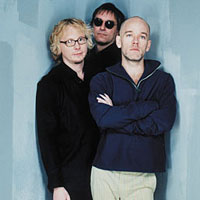 R.E.M. mark the point when post-punk turned into alternative rock. When their first single, "Radio Free Europe," was released in 1981, it sparked a back-to-the-garage movement in the American underground. While there were a number of hardcore and punk bands in the U.S. during the early '80s, R.E.M. brought guitar pop back into the underground lexicon. Combining ringing guitar hooks with mumbled, cryptic lyrics and a D.I.Y. aesthetic borrowed from post-punk, the band simultaneously sounded traditional and modern. Though there were no overt innovations in their music, R.E.M. had an identity and sense of purpose that transformed the American underground. Throughout the '80s, they worked relentlessly, releasing records every year and touring constantly, playing both theaters and backwoods dives. Along the way, they inspired countless bands, from the legions of jangle pop groups in the mid-'80s to scores of alternative pop groups in the '90s, who admired their slow climb to stardom. It did take R.E.M. several years to break into the top of the charts, but they had a cult following from the release of their debut EP, Chronic Town, in 1982. Chronic Town established the haunting folk and garage rock that became the band's signature sound, and over the next five years, they continued to expand their music with a series of critically acclaimed albums.
R.E.M. mark the point when post-punk turned into alternative rock. When their first single, "Radio Free Europe," was released in 1981, it sparked a back-to-the-garage movement in the American underground. While there were a number of hardcore and punk bands in the U.S. during the early '80s, R.E.M. brought guitar pop back into the underground lexicon. Combining ringing guitar hooks with mumbled, cryptic lyrics and a D.I.Y. aesthetic borrowed from post-punk, the band simultaneously sounded traditional and modern. Though there were no overt innovations in their music, R.E.M. had an identity and sense of purpose that transformed the American underground. Throughout the '80s, they worked relentlessly, releasing records every year and touring constantly, playing both theaters and backwoods dives. Along the way, they inspired countless bands, from the legions of jangle pop groups in the mid-'80s to scores of alternative pop groups in the '90s, who admired their slow climb to stardom. It did take R.E.M. several years to break into the top of the charts, but they had a cult following from the release of their debut EP, Chronic Town, in 1982. Chronic Town established the haunting folk and garage rock that became the band's signature sound, and over the next five years, they continued to expand their music with a series of critically acclaimed albums.Too famous
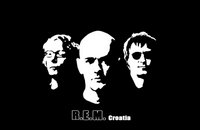 By the late '80s, the group's fan base had grown large enough to guarantee strong sales, but the Top Ten success in 1987 of Document and "The One I Love" was unexpected, especially since R.E.M. had only altered their sound slightly. Following Document, R.E.M. slowly became one of the world's most popular bands. After an exhaustive international tour supporting 1988's Green, the band retired from touring for six years and retreated into the studio to produce their most popular records, Out of Time (1991) and Automatic for the People (1992). By the time they returned to performing with the Monster tour in 1995, the band had been acknowledged by critics and musicians as one of the forefathers of the thriving alternative rock movement, and they were rewarded with the most lucrative tour of their career. Toward the late '90s, R.E.M. was an institution, as its influence was felt in new generations of bands.
By the late '80s, the group's fan base had grown large enough to guarantee strong sales, but the Top Ten success in 1987 of Document and "The One I Love" was unexpected, especially since R.E.M. had only altered their sound slightly. Following Document, R.E.M. slowly became one of the world's most popular bands. After an exhaustive international tour supporting 1988's Green, the band retired from touring for six years and retreated into the studio to produce their most popular records, Out of Time (1991) and Automatic for the People (1992). By the time they returned to performing with the Monster tour in 1995, the band had been acknowledged by critics and musicians as one of the forefathers of the thriving alternative rock movement, and they were rewarded with the most lucrative tour of their career. Toward the late '90s, R.E.M. was an institution, as its influence was felt in new generations of bands.OK .. Who lost their sunnies?
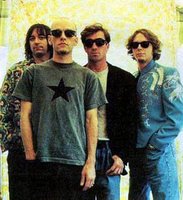 The Green tour proved to be draining for the group, and they took an extended rest upon its completion in 1989. During the break, each member pursued side projects, and Hindu Love Gods, an album Buck, Berry, and Mills recorded with Warren Zevon in 1986, was released. R.E.M. reconvened during 1990 to record their seventh album, Out of Time, which was released in the spring of 1991. Entering the U.S. and U.K. charts at number one, Out of Time was a lush pop and folk album, boasting a wider array of sounds than the group's previous efforts; its lead single, "Losing My Religion," became the group's biggest single, reaching number four in the U.S. Since the band was exhausted from the Green tour, they chose to stay off the road. Nevertheless, Out of Time became their biggest album, selling over four million copies in the U.S. and spending two weeks at the top of the charts. R.E.M. released the dark, meditative Automatic for the People in the fall of 1992. Though the group had promised a rock album after the softer textures of Out of Time, Automatic for the People was slow, quiet, and reflective, with many songs being graced by string arrangements by Led Zeppelin bassist John Paul Jones. Like its predecessor, Automatic for the People was a quadruple platinum success, generating the Top 40 hit singles "Drive," "Man on the Moon," and "Everybody Hurts."
The Green tour proved to be draining for the group, and they took an extended rest upon its completion in 1989. During the break, each member pursued side projects, and Hindu Love Gods, an album Buck, Berry, and Mills recorded with Warren Zevon in 1986, was released. R.E.M. reconvened during 1990 to record their seventh album, Out of Time, which was released in the spring of 1991. Entering the U.S. and U.K. charts at number one, Out of Time was a lush pop and folk album, boasting a wider array of sounds than the group's previous efforts; its lead single, "Losing My Religion," became the group's biggest single, reaching number four in the U.S. Since the band was exhausted from the Green tour, they chose to stay off the road. Nevertheless, Out of Time became their biggest album, selling over four million copies in the U.S. and spending two weeks at the top of the charts. R.E.M. released the dark, meditative Automatic for the People in the fall of 1992. Though the group had promised a rock album after the softer textures of Out of Time, Automatic for the People was slow, quiet, and reflective, with many songs being graced by string arrangements by Led Zeppelin bassist John Paul Jones. Like its predecessor, Automatic for the People was a quadruple platinum success, generating the Top 40 hit singles "Drive," "Man on the Moon," and "Everybody Hurts."Stairway to heaven?
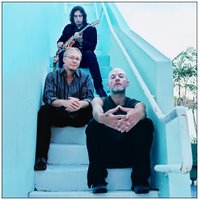 After piecing together two albums in the studio, R.E.M. decided to return to being a rock band with 1994's Monster. Though the record was conceived as a back-to-basics album, the recording of Monster was difficult and plagued with tension. Nevertheless, the album was a huge hit upon its fall release, entering the U.S. and U.K. charts at number one; furthermore, the album won praise from a number of old-school critics who had been reluctant to praise the band, since they didn't "rock" in conventional terms. Experiencing some of the strongest sales and reviews of their career, R.E.M. began their first tour since Green early in 1995. Two months into the tour, Bill Berry suffered a brain aneurysm while performing; he had surgery immediately and had fully recovered within a month. R.E.M. resumed their tour two months after Berry's aneurysm, but his illness was only the beginning of a series of problems that plagued the Monster tour. Mills had to undergo abdominal surgery to remove an intestinal tumor in July; a month later, Stipe had to have an emergency surgery to remove a hernia. Despite all the problems, the tour was an enormous financial success, and the group recorded the bulk of a new album. Before the record was released in the fall of 1996, R.E.M. parted ways with their long-time manager Jefferson Holt, allegedly due to sexual harassment charges levied against Holt; the group's lawyer, Bertis Downs, assumed managerial duties.
After piecing together two albums in the studio, R.E.M. decided to return to being a rock band with 1994's Monster. Though the record was conceived as a back-to-basics album, the recording of Monster was difficult and plagued with tension. Nevertheless, the album was a huge hit upon its fall release, entering the U.S. and U.K. charts at number one; furthermore, the album won praise from a number of old-school critics who had been reluctant to praise the band, since they didn't "rock" in conventional terms. Experiencing some of the strongest sales and reviews of their career, R.E.M. began their first tour since Green early in 1995. Two months into the tour, Bill Berry suffered a brain aneurysm while performing; he had surgery immediately and had fully recovered within a month. R.E.M. resumed their tour two months after Berry's aneurysm, but his illness was only the beginning of a series of problems that plagued the Monster tour. Mills had to undergo abdominal surgery to remove an intestinal tumor in July; a month later, Stipe had to have an emergency surgery to remove a hernia. Despite all the problems, the tour was an enormous financial success, and the group recorded the bulk of a new album. Before the record was released in the fall of 1996, R.E.M. parted ways with their long-time manager Jefferson Holt, allegedly due to sexual harassment charges levied against Holt; the group's lawyer, Bertis Downs, assumed managerial duties.Back in the old days
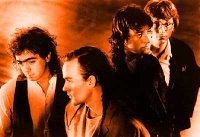 In October of 1997, R.E.M. shocked fans and the media with the announcement that Berry was amicably exiting the group to retire to life on his farm; the remaining members continued on as a three-piece, soon convening in Hawaii to begin preliminary work on their next LP. Replacing Berry with a drum machine, the sessions resulted in 1998's Up, widely touted as R.E.M.'s most experimental recording in years. It was only a brief change of direction, since the band's next album, 2001's Reveal, marked a return to their classic sound. Around the Sun followed in 2004. ~ [Stephen Thomas Erlewine]
In October of 1997, R.E.M. shocked fans and the media with the announcement that Berry was amicably exiting the group to retire to life on his farm; the remaining members continued on as a three-piece, soon convening in Hawaii to begin preliminary work on their next LP. Replacing Berry with a drum machine, the sessions resulted in 1998's Up, widely touted as R.E.M.'s most experimental recording in years. It was only a brief change of direction, since the band's next album, 2001's Reveal, marked a return to their classic sound. Around the Sun followed in 2004. ~ [Stephen Thomas Erlewine]For Led Zeppelin see #365, #422, #577, #957  What does Rolling Stone think about R.E.M?
What does Rolling Stone think about R.E.M?
 Need more information on the song "Shiny Happy People"? Here are some SongFacts for you to ponder over! Click here > Fact Stuff
Need more information on the song "Shiny Happy People"? Here are some SongFacts for you to ponder over! Click here > Fact Stuff
 Official Website for R.E.M @ This addy & for other Information/Biography click this link > Here ~ crowbarred [because power is knowledge]
Official Website for R.E.M @ This addy & for other Information/Biography click this link > Here ~ crowbarred [because power is knowledge]
 What does Rolling Stone think about R.E.M?
What does Rolling Stone think about R.E.M? Around the Sun is full of what are ultimately anti-power ballads, the kind that question rather than bluster, favoring maybe over might. It's another slow, meandering CD from a trio that refuses to fake a full recovery in the wake of drummer Bill Berry's departure in 1997. It would be too easy for R.E.M. to ride Coldplay's coattails on a rock-anthem remedy. They'd rather struggle on their own terms. [Source: RS]
 Need more information on the song "Shiny Happy People"? Here are some SongFacts for you to ponder over! Click here > Fact Stuff
Need more information on the song "Shiny Happy People"? Here are some SongFacts for you to ponder over! Click here > Fact Stuff Official Website for R.E.M @ This addy & for other Information/Biography click this link > Here ~ crowbarred [because power is knowledge]
Official Website for R.E.M @ This addy & for other Information/Biography click this link > Here ~ crowbarred [because power is knowledge] .
Rolling Stone Top 500 Songs ranked this song at Number (2 other songs made R.S Top 500) and the Album ranked at Number (3 other Albums made R.S Top 500)
This song has a Definitive 1000 rating of 68 out of 108 pts
Search by Genre: ALT POP-ALT PUNK-ALT ROCK-ALTERNATIVE-BIZARRE-BLUES-BRIT POP-COMEDY-COUNTRY-CROONER-DANCE-DISCO-DO WOP-ELECTRONIA-FOLK SINGER-FOLK ROCK-FUNK-GARAGE ROCK-GLAM ROCK-GOSPEL-GRUNGE-GUITARIST-HAIR ROCK-HARD ROCK-HIP HOP-INDIE POP-INDIE ROCK-INDUSTRIAL ROCK- INSTRUMENTAL-JAZZ-LAZY SUNDAY-NEW WAVE-NU ROCK-POP-POP ROCK-PROG ROCK-PSYCHEDELIC ROCK-PUNK POP-PUNK ROCK-R&B-RAP-REGGAE-ROCK-ROCK N ROLL-SINGER SONGWRITER-SKA ROCK-SKIFFLE-SOFT ROCK-SOUL-SOUTHERN ROCK-SURF ROCK-SYNTH POP-TENOR-VOCAL
By The Year 1955 to 2005:
1955, 1956, 1957, 1958, 1959, 1960, 1961, 1962, 1963, 1964, 1965, 1966, 1967, 1968, 1969, 1970, 1971, 1972, 1973, 1974, 1975, 1976, 1977, 1978, 1979, 1980, 1981, 1982, 1983, 1984, 1985, 1986, 1987, 1988, 1989, 1990, 1991, 1992, 1993, 1994, 1995, 1996, 1997, 1998, 1999, 2000, 2001, 2002, 2003, 2004, 2005

www.crowbarred.com
Labels: REM 712

















0 Comments:
Post a Comment
<< Home